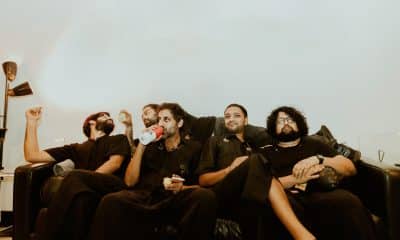Sound Plunge
Flying Solo with Indie Music
Several musicians and producers are coming out with their individual music projects where they operate all aspects of music production and sometimes performance; to draw out their private realities into music which solely resonates their own self. soundplunge_test takes a closer look at these one-man bands.
Lou Reed did it. Ozzy Ozbourne did it. Heck, Sting did it. Lou had Velvet Underground, Ozzy had his Black Sabbath and Sting had a fair share of bands too, but they branched out into their own music all over the map. A growing tribe of indie musicians and producers in India are also choosing to pursue their solo music projects. Consider the latest indie album to garner good attention, Subterra, in which eight independent electronica producers have composed tracks individually for one record. The studio has evolved into a personal space with digital music production coming into play. As Raxit Tewari (Sky Rabbit lead vocalist who has started his own project Your Chin) puts it, “I guess for the longest time all these things were a little inaccessible than the way they are now. You can literally run a studio from your own house. Participating in these ventures has become a lot more possible.”
It might not be an either/or choice for musicians though, with plenty of them managing both at the same time. For instance, Kartik Pillai, part of two bands Peter Cat Recording Co. and Begum, manages to stake out time (and music) for his solo outfit Jamblu. In a recent interview with Koniac Net, who have incidentally also come up with their new EP (read here) frontman David Abraham talked about his now five-member band which he started off solo, “I miss writing every single part of a song. It’s always been a lot of fun. Also being able to work around my own set time, and not worry about scheduling recordings, etc. around different timetables. But these are small luxuries compared to what we’ve accomplished as a full band. We have a hell of a lot of fun writing, recording and rehearsing together. Every meet-up is like a comedy act and pure passion for a shared love mixed in one. You can’t experience that as a solo act. ”
Arman Menzies, the person behind Zokhuma, a kitschy electronica do says the scene has been growing bigger and better. “Every day I see new musicians that catch my ear. This didn’t happen a few years ago. I would come across a lot of Indian bands and most of them were shit or trying hard to sound like another band and in that they lost their sound and originality.”
We asked some of the musicians out there who took the step to take the lurch and go solo about all aspects of the experience and here’s what we got to hear:
Raxit Tiwari (Your Chin)
Started in 2011, Sky Rabbit vocalist’s solo project is one EP old – Scatter Nature comprises of dreamy yet catchy electronica beats.
Solo projects especially in electronica, have been the mood of the times. Is a one-man show the future in the indie music scene in India and abroad?
I guess for the longest time all these things were a little inaccessible than the way they are now. You can literally run a studio from your own house. I guess participating in these ventures has become a lot more possible. A whole bunch of people, who wanted but could not for the longest time, are doing it. I don’t know if it is the future or not for music will continue to be made in ways more than one. It is much easier now than it ever was to sort of go ahead and do it.
[soundcloud url=”https://api.soundcloud.com/tracks/131958570″ params=”auto_play=false&hide_related=false&visual=true” width=”100%” height=”450″ iframe=”true” /]
Rohan Hastak (Big City Harmonics)
Big City Harmonics is Rohan Hastak’s electronica act, launched in 2013. Counting Bonobo and Nightmares on Wax as influences, plans are on to make it a live band with other members.
How performing solo is a different experience from performing as a band/collaborative project.
Playing solo is great, but personally, I’m moving towards finding more ways to collaborate with people live, whether it’s with other instruments or a visual rig. It’s nice to have control over all the music you make in the studio, but on stage I can’t think of anything better than playing with other musicians.

Jamblu – “Digital production gives you the power to do absolutely anything you want and portray or foster a space/thought in your head which is not always as easy to communicate .”
Kartik Pillai (Jamblu)
Post-dance ambient lounge is how Jamblu would describe his music, and we could not come up with a better nail for it. Made for those dark crevices inside your head.
How does digital production help with making music alone? Are the aesthetics of music making changing in that aspect?
Digital production gives you the power to do absolutely anything you want and portray or foster a space/thought in your head which is not always as easy to communicate or describe to another person for fear of redundancy and loss of thought/emotion. You can also let a lot of random things shape your song/sound – for example, I use samples of heating ducts (vents) to explosions to birds chirping so as to create music through manipulation. For me, the combination of a highly personal reality and the random inputs of what is around you also result in a melding of organic and synthetic actualization. I’ve seen solo artists turn into bands and vice versa in India and the world, and depending on what drove them to it they’ve obviously moved onto what they would consider a higher plane of creativity/performance. Nowadays, songs and performers are becoming more cohesive in terms of genre and execution and in general more documentative because now we can literally capture moments and manipulate them as we see fit – a motif which excites me to no end.
Arman Menzies (Zokhuma)
Experimental electronica that you need to devote your time to let it sink in, before it sucks you in right back.
What would you cite as a reason for being a solo producer over a band?
The possibilities are infinite; you are not limited by much. I don’t have to get an instrumentalist to write another part. Also there is a certain sense of control that I have. I can write the melody and then I can write my own drum part, bass line and lead melody. It is somewhat like me sitting in each of my band member’s shoes and learning their parts.
[soundcloud url=”https://api.soundcloud.com/tracks/135512428″ params=”auto_play=false&hide_related=false&visual=true” width=”100%” height=”450″ iframe=”true” /]











































